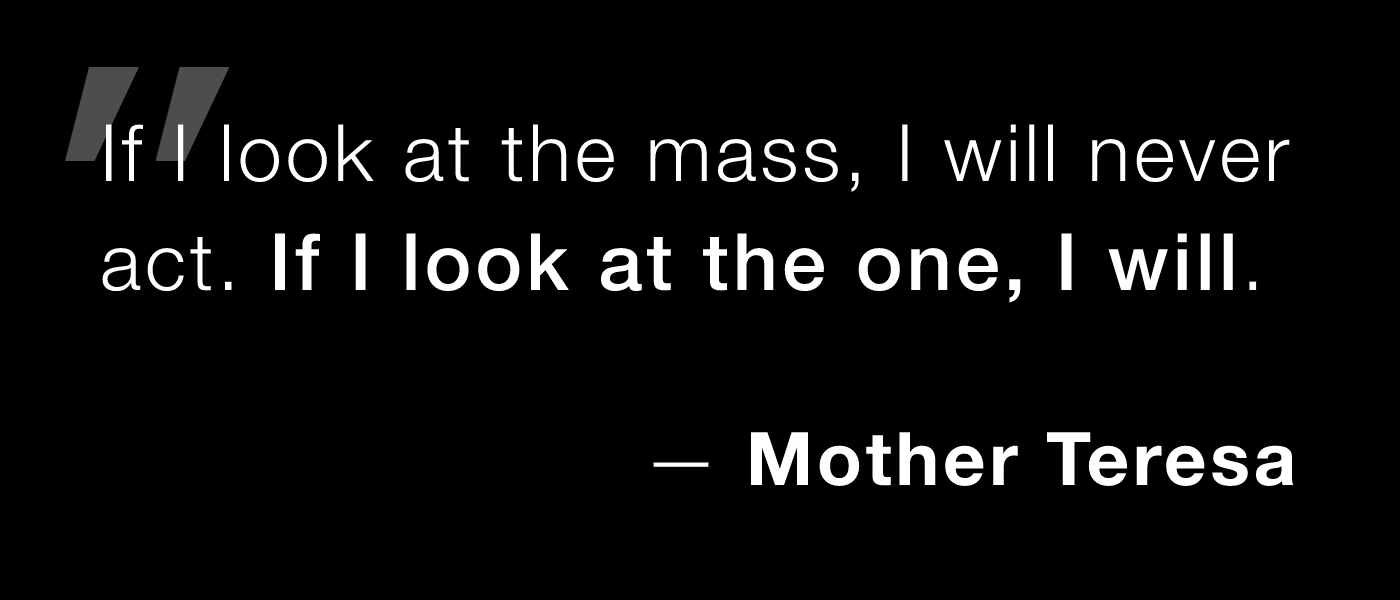One Unhappy User Is A Tragedy; One Thousand Unhappy Users Is A Statistic
At InVision, we often talk about the importance of Compassion: compassion for each other; and, compassion for our users. And while I absolutely love this about our company, compassion isn't something that comes naturally. Compassion is a muscle - one that requires regular exercise and incurs a certain degree of discomfort. It can create tension within an organization; and, may even pit short-term efforts against a long-term vision. Compassion is not easy; but, compassion is critical for our company, for our users, and for our humanity. As such, we must find strategies that grant us latitude in such matters. For me, it means focusing on "the one" user.
Mother Teresa said:

If I look at the mass, I will never act. If I look at the one, I will.
Mother Teresa understood something critical about human psychology: the brain seeks to protect itself from pain. Instead of having a direct correlation to the degree of human suffering that we see, feelings of compassion, empathy, and sympathy appear to have a perversely inverse relationship. Meaning, the more people we see suffer, the less we tend to feel a sense of sympathy for those people.
Dr. Keith Payne suggests that this is a circuit breaker - a mechanism by which we can stop ourselves from getting overwhelmed by our emotions. When we see so much suffering, the emotional toll is high; and so, we protect ourselves by curbing those emotions.
Mother Teresa got around this limitation of the human condition by maintaining a narrow focus: the person in front of her.
While the pain that we see in a web application is not nearly on par with the suffering that Mother Teresa witnessed, I believe that the same strategy works for us Software and Support engineers: focus on the one user in front of us. Don't worry too much about the roadmap; don't fret over a Return on Investment (ROI); simply see the suffering of the customer in front of us and - using our best judgment - act on it.
Doing this helps that user. And, it will almost certainly help many more users who aren't unhappy enough to speak up. But, equally as important, it allows us to exercise our compassion. It allows us to build that muscle up rather than letting it atrophy in the flow of a Gantt Chart or between the lines of a Mission Statement.
Of course, not everyone in an organization should do this. There has to be, within an organization, people whose job it is to look forward - individuals who can harden themselves to the suffering of the one so that they may plan a future that helps the many. What we need is a balance: a healthy tension between the two strategies. Neither is fully correct; and, neither is entirely wrong. As steel sharpens steel, one approach works to sharpen the other.
This is why, when a manager tells me that what I'm doing doesn't "further the company strategy", I respectfully agree; and then, I go back to helping the user in front of me. Worrying about the roadmap is a manager's job. Helping the user in that moment is my job. In order to be successful as a team, we must find a way to meet somewhere in the middle - we must embrace a healthy tension.
In A Quantum Theory of Customers, Seth Godin speaks tangentially to this:
There's a role here for human intervention; and it needs to be human intervention based on an understanding that different people want different things in different moments. And that if you are putting your customer service people through a grinder - giving them nothing but rules that they are not allowed to break - it's extremely unlikely that you will develop a brand for the ages.
.... and yes, Zappos sold for almost a billion dollars. Because a customer service rep was willing to sit for 2-hours, 3-hours, 4-hours on the phone talking about shoes. Because, they weren't talking about shoes - they were talking about their customers.
So I think it's naive to say all customer service should be instant and perfect.... [but] we accept that you [the customer] will have quantum moments - when it's all on the table, when the chips are down. And, in that moment, we will respect where you came from, see who you are, make a judgment about what you are worth to us in the future, and us to you, and act accordingly. (Akimbo Podcast)
The pain that a user feels now isn't necessarily the same pain that they will feel in the future. And, that's OK. There's no reason we can't do our best, with the resources that we have at our disposal, to provide value and to practice compassion in both this moment and in the moments to come. These two are not mutually exclusive; and, this is not a zero-sum game.
Having compassion for our users isn't always easy; but, it is always a key component to our success. In my role, I find that I am most able to exercise and to encourage compassion by focusing on the "one user". And, by finding ways to see individuals in their moment of need and to remove friction from their professional lives.

Reader Comments